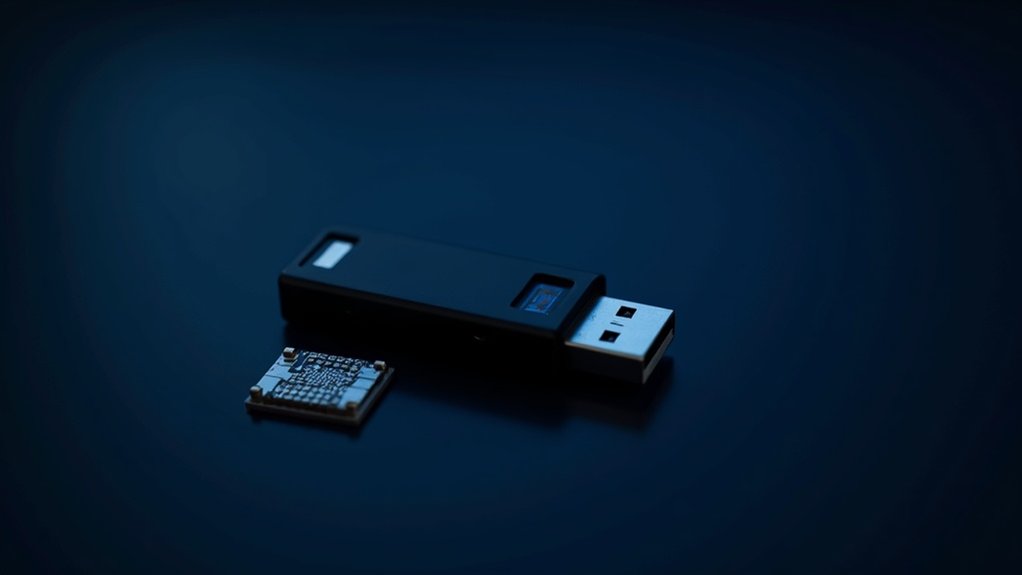Hardware wallets are physical devices resembling USB drives that store private keys offline. They never expose these keys to the internet, creating a critical barrier between hackers and your crypto. Transactions require physical possession plus a PIN, making remote theft virtually impossible. The wallet internally signs transactions using sophisticated cryptography while keeping sensitive data isolated. No third-party custodians involved. Just you, your device, and uncompromising security. Serious investors know these little gadgets aren’t optional in today’s digital Wild West.
While online exchanges continue to get hacked with alarming regularity, hardware wallets have emerged as the gold standard for cryptocurrency security. These small devices, resembling ordinary USB drives, don’t actually store your crypto. Surprise! They store something far more valuable – the private keys that control access to your digital assets.
And unlike those risky “hot wallets” connected to the internet, these babies stay offline. Cold storage. Maximum protection.
The magic happens inside a tamper-resistant secure element chip. This isn’t your average computer chip. It’s specifically designed to resist both physical tampering and digital attacks.
Private keys generate within this fortress and never, ever leave. Think of it as Vegas for your crypto secrets – what happens in the hardware wallet stays in the hardware wallet.
When you want to send crypto, the transaction process is brilliantly simple yet secure. Your connected device (computer or phone) sends transaction details to the hardware wallet. The wallet signs the transaction internally using your private key, then sends the signed transaction back for broadcasting to the blockchain. Your keys remain safely isolated the entire time.
The cryptographic technology powering these devices is legitimately impressive. Most hardware wallets use the Elliptic Curve Digital Signature Algorithm, creating a one-way street where public keys come from private keys, but nobody can reverse-engineer the process. Those private keys are fundamentally ultra-sensitive passwords. Lose them, lose your crypto. Forever.
Why bother with a hardware wallet instead of free software alternatives? No internet connection means no remote hacking. No third-party custodians means no exchange collapses taking your funds down with them. Popular models like Ledger and Trezor have become trusted names in cryptocurrency security.
Plus, you get multi-factor security – physical possession plus PIN codes or passwords. Even if your computer has more viruses than a preschool in flu season, your crypto stays safe. For serious investors, hardware wallets aren’t just an option. They’re a necessity.
Many users appreciate that hardware wallets offer full control over their cryptocurrency without relying on potentially vulnerable third parties.
For added security when making transactions, it’s highly recommended to perform test transfers first to verify the recipient’s address before sending large amounts.
Frequently Asked Questions
Can Hardware Wallets Be Hacked Remotely?
Hardware wallets generally can’t be hacked remotely. Their whole purpose is keeping private keys isolated from internet-connected devices.
Without physical access, attackers face major limitations.
Sure, there are potential vulnerabilities through communication interfaces like USB or during firmware updates.
Malware on a connected computer might intercept transaction data. But the keys themselves? They stay put.
Complete remote exploitation? Extremely rare. Physical access is almost always required for serious attacks.
What Happens if I Lose My Hardware Wallet?
Losing a hardware wallet isn’t the end of the world. As long as you have your recovery seed phrase safely stored, you can simply buy a new device and restore everything.
Enter those 12-24 words in the correct order, and boom—all your crypto reappears. No seed phrase though? You’re completely screwed. Those funds are gone forever. Recovery typically takes under 30 minutes.
Thieves can’t access your crypto without both the device and PIN.
Do Hardware Wallets Work With All Cryptocurrencies?
No, hardware wallets don’t support all cryptocurrencies. They’re picky.
Trezor and Ledger support thousands—Bitcoin, Ethereum, and major tokens—but not everything. Each model has limitations. You might need specific apps or third-party integrations for certain coins.
New or obscure cryptos? Good luck. Manufacturers constantly update firmware to add support, but there’s always that random token that won’t work.
Always check compatibility lists before transferring. Simple as that.
How Often Should I Update My Hardware Wallet’s Firmware?
Hardware wallet firmware should be updated every 6-8 months typically, but there’s no fixed schedule. Updates arrive when needed for security patches, bug fixes, or new features.
Don’t rush to install immediately—smart users wait a few days for community feedback.
Sure, hot wallets need constant updates, but hardware wallets? Less urgent, still necessary. Keep an eye on official channels.
Blockchain upgrades and regulatory changes might trigger more frequent updates. No schedule, just vigilance.
Can I Access My Crypto Without the Hardware Wallet?
Crypto owners can access their funds without a hardware wallet, but it’s risky business.
Two main options exist: using the recovery seed phrase with a compatible wallet or importing private keys to software wallets. Both methods expose those precious keys to online threats. Think hackers, malware, the whole digital nightmare.
Some setups offer multi-signature solutions as alternatives.
Bottom line? Without the hardware wallet or seed phrase, those crypto assets are basically gone forever.









